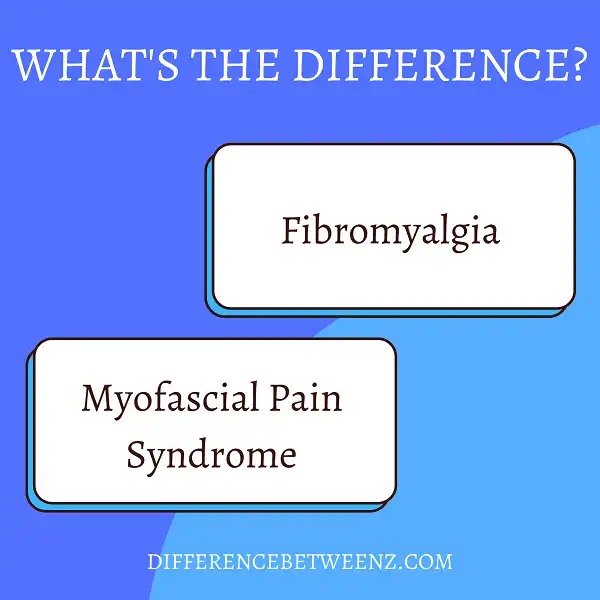Two common chronic pain conditions are fibromyalgia and myofascial pain syndrome. While they both cause long-term pain, they are two different conditions with different symptoms. In this post, we’ll take a look at the difference between fibromyalgia and myofascial pain syndrome.
What is Fibromyalgia?
Fibromyalgia is a condition that causes widespread pain and fatigue. The exact cause of fibromyalgia is unknown, but it is thought to be related to changes in the way the nervous system processes pain signals. Fibromyalgia is more common in women than men and usually begins after the age of 40. People with fibromyalgia may also experience other symptoms such as sleep problems, memory difficulties, and mood changes. There is no cure for fibromyalgia, but treatments can help manage the symptoms. These include medication, exercise, and stress-reduction techniques. Fibromyalgia can be a challenging condition to live with, but with the right support, people with fibromyalgia can lead fulfilling lives.
What is Myofascial Pain Syndrome?
Myofascial Pain Syndrome (MPS) is a chronic pain condition that affects the connective tissue in the body. The cause of MPS is unknown, but it is believed to be related to an injury or overuse of the muscles. MPS can cause pain and stiffness in the muscles, as well as trigger points, which are tender areas that can refer pain to other parts of the body. Treatment for MPS typically includes rest, ice, and heat therapy, as well as massage and stretching exercises. Myofascial Pain Syndrome is a chronic condition that can be difficult to treat, but with patience and perseverance, most people with MPS can find relief from their symptoms.
Difference between Fibromyalgia and Myofascial Pain Syndrome
Fibromyalgia and myofascial pain syndrome are two conditions that can cause widespread pain and fatigue.
- Fibromyalgia is a disorder that is characterized by chronic widespread pain, as well as fatigue, sleep, memory, and mood problems.
- Myofascial pain syndrome is a condition that causes chronic pain in the muscles and soft tissues.
- There are several differences between these two conditions. Fibromyalgia typically causes more fatigue and sleep problems than myofascial pain syndrome.
- Fibromyalgia also tends to cause more cognitive issues, such as memory problems and difficulty concentrating.
- Myofascial pain syndrome, on the other hand, often causes more localized pain in specific muscles or muscle groups.
In addition, myofascial pain syndrome is often triggered by specific activities or positions, whereas fibromyalgia is not. As a result, these two conditions can often be distinguished based on their symptoms.
Conclusion
Fibromyalgia and myofascial pain syndrome are two conditions that are often confused with one another. However, there are some key differences between the two. In general, fibromyalgia is characterized by widespread musculoskeletal pain, while myofascial pain syndrome is associated with pain in specific areas of the body. Fibromyalgia is also thought to be caused by a combination of genetic and environmental factors, while myofascial pain syndrome may be caused by an injury or overuse.
Finally, people with fibromyalgia often experience fatigue and cognitive difficulties, while those with myofascial pain syndrome generally do not. If you are experiencing chronic muscle pain, it’s important to get properly diagnosed so that you can receive appropriate treatment. Talk to your doctor about any concerns you have and ask for a referral to a specialist if needed.


